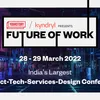The Good Glamm Group's Deep Ganatra on why the future belongs to automation and more
At YourStory’s Future of Work summit 2022, Deep Ganatra, CTO, The Good Glamm Group, talked at length about changes accelerated by the COVID-19 pandemic, strategies for companies to follow, and emerging technologies in the space.
Initially known as MyGlamm when it was founded in 2015, is making such remarkable waves that the company needs no introduction. They’ve created communities for women to talk about beauty and trends, and have big names like , , and under their umbrella. With POPxo and ScoopWhoop bringing fresh, youth-centric content to millions of users, the company has soared to great heights.
There is a rapid change in the way consumers make decisions now, and companies have to embrace these shifts. Yet, there remains a lot of aspects for brands to navigate through in the past few years. Keeping in mind the COVID-19 pandemic, there are also forces like climate change, the rise of AI (artificial intelligence) and other emerging technologies, increased cyber attacks and skill gaps and challenges of innovation that have to be addressed. There is also competition in virtually every sector of the industry today with shifts accelerated due to the pandemic. Amid such a dynamic environment, the ‘future of work’ holds innumerable challenges and possibilities.
Change is the only constant
What, then, should the top management prioritise in 2022 for excellent performance?
Deep Ganatra, CTO (chief technology officer), The Good Glamm Group, delved deep into this paradigm at YourStory’s Future of Work summit 2022.

“One of the topmost challenges earlier was to work remotely. As a leader, many companies were not prepared for this. Now, thankfully, people have adapted to the hybrid work environment, and that challenge is sorted. The next big challenge that companies must focus on is that the workforce is going to be global now,” Deep shared. The way it used to be earlier was that people in the US would outsource to India, but Deep added how he wouldn’t be surprised if in the next few years India starts reversing the trend.
While several international and some domestic companies follow this model, Deep believes that many Indian companies are not prepared for this shift yet. “It’s something that we should become ready for especially when it comes to working in different time zones. That will be a different challenge altogether,” opined the technology leader.
There’s another pandemic-induced shift: business continuity plans. “The pandemic shook up everyone,” said Deep, adding, “So, people will now have to keep the worst scenarios in mind and plan their business continuity in a way that they can cope despite travel and transport restrictions, as well as lockdowns.”
Thirdly, he brought up another crucial point. “How do we offload the work to machines? We have been focusing more on getting work done by people. That’s how it has been working, but that’s not going to be the future. The future is always going to be about focusing on automation,” he pointed out.
Horizon planning as a strategy for companies
“Horizon planning is extremely necessary,” highlighted Deep. What should be the approach in the coming years?
“We need to create a balance between tech and business horizon vision. I generally divide that into two different phases. One is short-term, which is between one to three years, and I see a long-term one, which is three to five years,” he added.
Usually, people envision a cap of five years as short-term and a time frame of over five years as long-term. “The reason I’m not doing this is because tech is evolving so quickly and is so fast-paced that if we plan for over five years, many things would have changed by then,” he highlighted.
The time crunch in separating long-term and short-term goals is to ensure that both the tech and business aspects are aligned. “We usually have a discussion about this where we decide that these are what we have to do for business within the next one to two years roughly. Then, we align the tech vision. If the business is going to reach a certain stage after a few years, the tech needs to be about 4x or 5x ahead of that. Because if the business surges, and the tech is not prepared for that it will be a challenge.”
There is a lot of talk about The Good Glamm Group positioning itself to become an FMCG (fast moving consumer goods) conglomerate from India, and it relies on tech for that. “We consider ourselves a tech-driven D2C (direct-to-consumer) company,” said Deep. Explaining how tech is aligned with the company’s broader goals, he said, “Whatever decision we take, tech has a larger role to play. In this case, when we’re bringing many brands together, our first and foremost goal is to bring everyone under a single stack. This gives us the flexibility to have all the brands interact with each other swiftly.”
They recently launched the ‘Good Points Loyalty Programme’, which is common across all their brands. It does not matter whether purchases are made online or offline, or from which branch, the points remain with the consumer.
ALSO READ

Emerging technologies in the landscape
“AI can help in increasing productivity,” pointed out Deep.
Some of the big trends that will dominate the D2C space? “Tech companies should now start focusing on building customer experience-rich applications, which take advantage of high-speed internet. For a richer experience, you need something like 5G. VR-based applications are what I personally feel is going to be the next big thing.”
For those in business, Deep feels that technology is so interesting that leaders should never stop exploring opportunities there. “It’s okay to fail, but it is something that we must explore in order to genuinely run our business in the best way,” he surmised.
With evolving technological trends, The Good Glamm Group is eyeing a multidimensional architecture that can be brought under one stack. This applies to the multiple brands under the company.
“We’re going to bring our focus towards automation. Automation can now do simple things like testing, QA (quality assurance), and can even automate several business-related activities where one can have chatbots or workflow set-ups. As a group, we’re looking to take software development (Dev) and information technology operations (Ops) to a new level. We need to create a space where every process works seamlessly,” he shared.
A piece of advice Deep would like to give new-age tech leaders? “It would be to not overthink and instead take decisions quickly because right now many tech leaders fall into the loop of decision-making. These go through many people at a go and it takes months for execution. This happens because leaders are afraid to fail. The mindset should be that it’s okay to fail,” signed off Deep.

Edited by Sanhati Banerjee








